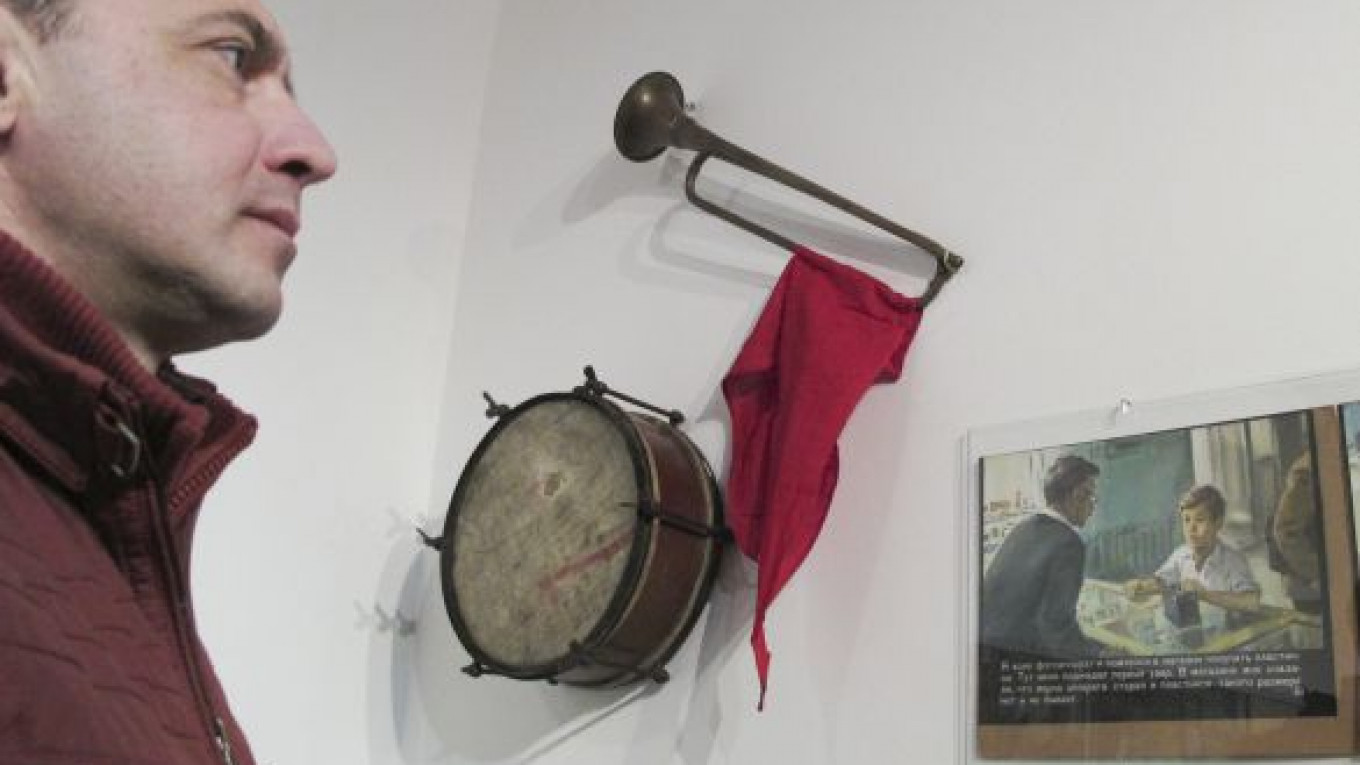A failed spy and now a television personality, Anna Chapman is seen today — by the government at least — as a role model for the young.
For a glimpse at how spying was portrayed and seen by Soviet children, head to the “Brown Button or Spymania” exhibition at Proun Gallery.
Anyone looking for a history of Soviet espionage will be disappointed as there are only a few spying artifacts taken from the Border Guard Service collection on show, such as tiny spy cameras.
Instead, the exhibit features paintings of scenes from the life of the Soviet youth organization Pioneers, specially designed statues of Pioneer faces and old Soviet movies as it tries to send visitors back to a time when any foreigner was a possible spy.
“We don’t have real spy artifacts, but we have a mood of the general atmosphere [back then],” curator Daria Makarova said.
The “Brown Button” in the exhibit’s name comes from a poem of the same name written by Yevgeny Dolmatovsky in 1939, a time of deep suspicion of foreigners as the Soviet Union, a country surrounded by what it saw as enemies, moved toward war.
In the poem, a brave young pioneer finds a strange button with “non-
Russian characters” on it. In the days before mass-market production, this is a significant discovery and his diligence enables the authorities to capture a Chinese spy.
“Inside his pocket were revolver bullets and a map of Soviet installations,” reads the poem, which finishes with the words: “And that is how the Soviet border is protected / No bastard can get through the Soviet border.”
The term “foreign spy” was both a frightening label — often used to attack any opponent of Stalin’s regime, mainly without any credence — and for children growing up at the time a fascinating subject, fueled by Soviet films and books that told of Soviet heroes battling against the foreign spy.
The organizers play on this nostalgia by placing “The Fate of the Drummer” by children’s writer Arkady Gaidar, grandfather of the late Prime Minister Yegor Gaidar, at the heart of the exhibit.
The book tells of a young boy who discovers that his charming uncle is actually a foreign spy. He turns him in to the Soviet secret police.
The novel was written in 1938 as the purges hit the Soviet Union, but it retained its popularity and a film — on show at the exhibit — was made in the 1970s.
There is also room at the exhibit for the well-known Pavlik Morozov, the young Pioneer who became a Soviet icon after he supposedly denounced his father to the authorities in 1932. He was, as the story goes, later killed by his family for his betrayal. A statue of the boy stands in the exhibit.
One of the odder parts of the exhibit is a film where former Culture Minister Mikhail Shvydkoi and other aging cultural figures re-enact spy films.
In the film, Shvydkoi walks with the suspicious look of a spy from a Cold War film. As he walks along, another man secretly photographs him from a car window and he covers his face with a copy of The Moscow Times so as to stop being spotted.
“Brown Button or Spy Mania” runs through March 6 at Proun Gallery. Winzavod Center for Contemporary Art. 1 4th Syromyatnichesky Pereulok, Bldg. 6. Metro Kurskaya. Tel. 917-4646, proungallery.ru.
A Message from The Moscow Times:
Dear readers,
We are facing unprecedented challenges. Russia's Prosecutor General's Office has designated The Moscow Times as an "undesirable" organization, criminalizing our work and putting our staff at risk of prosecution. This follows our earlier unjust labeling as a "foreign agent."
These actions are direct attempts to silence independent journalism in Russia. The authorities claim our work "discredits the decisions of the Russian leadership." We see things differently: we strive to provide accurate, unbiased reporting on Russia.
We, the journalists of The Moscow Times, refuse to be silenced. But to continue our work, we need your help.
Your support, no matter how small, makes a world of difference. If you can, please support us monthly starting from just $2. It's quick to set up, and every contribution makes a significant impact.
By supporting The Moscow Times, you're defending open, independent journalism in the face of repression. Thank you for standing with us.
Remind me later.






